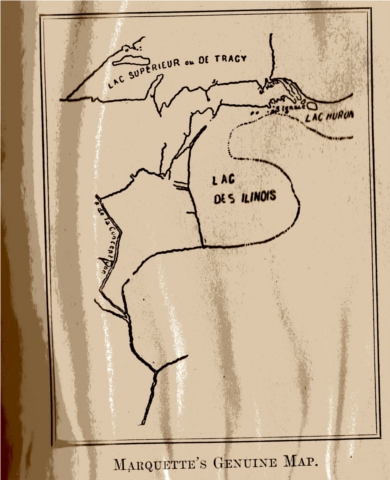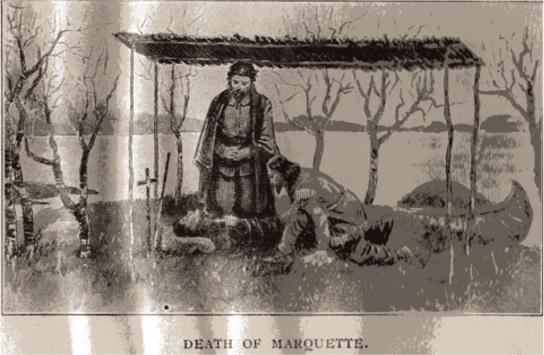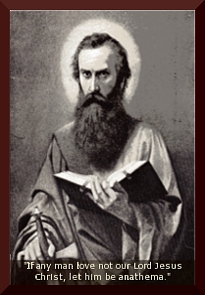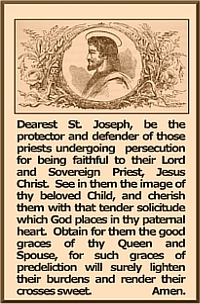As it sometimes happens, while dusting, I got my hands on a book I couldn’t put down. It’s about New France. While reading it, I couldn’t help but call to mind the whole post-Conciliar mess, particularly the “spirit of Assisi” which makes of a false unity the most novel of “virtues” in the stead of our Apostolic Faith. The present crisis in the Church is a result of the loss of Faith! What we need in these times, are teachings and examples which will bolster our Faith, as for example, Fr. McMahon, SSPX, defending our Catholic sanctuary against the intrusion of pagan Buddhists who were invited there by the in-good-standing, in-full-communion, Catholic pastor.
And of course, we must read genuinely Catholic material, preferably that which was written before the 1960’s. Amazingly, though, the book to which I refer, is Catholic, but it is not a Catholic book! By that, I mean that it was printed (1924) by a secular press, Flanagan Co., and that the contents are edifying and a greater boost to my Catholic faith than…(feel free to fill in the blank.)
Here is my book report on The Last of a Great Indian Tribe. I hope you will be as edified as I was by the life of one great missionary of old. He was a Traditionalist, you know.
+++++
Father Jacques Marquette (1637–1675)
On December 8, 1672, Feast of the Immaculate Conception, Louis Jolliet, having traveled from Quebec, reached Saint Ignace where he met Fr. Marquette. Fr. Marquette wrote of that day, “The day of the Immaculate Conception of the Holy Virgin whom I had continually invoked since coming to the country of the Ottawas, to obtain from God the favor of being enabled to visit the nations on the river Mississippi – this very day was precisely that on which M. Jolliet arrived with orders to go with him on this discovery. I was all the more delighted with this news because I saw my plans about to be accomplished, and found myself in the happy necessity of exposing my life for the salvation of all those tribes, especially the Illinois, who, when I was at St. Esprit, had begged me very earnestly to bring the Word of God among them.”
The following spring, on May 17, 1673, accompanied by five French-Indian companions, Marquette and Jolliet embarked upon two birch canoes and set out westward along the north shore of Lake Michigan to Grande Baye, now called Green Bay. Father Marquette entrusted the whole enterprise to our Lady under her title of the Immaculate Conception, promising that he would do whatever was in his power to have the Great River named The Conception, in her honor. (Hernando de Soto had already on May 8 of 1541, named it the River of the Holy Spirit.)
Father Marquette continued: “Before embarking we all offered up prayers to the Holy Virgin, which we continued to do every morning, placing ourselves and the events of the journey under her protection, and after having encouraged each other, we got into our canoes…the joy that we felt at being selected for this expedition animating our courage and rendering the work of paddling from morning to night agreeable to us.”
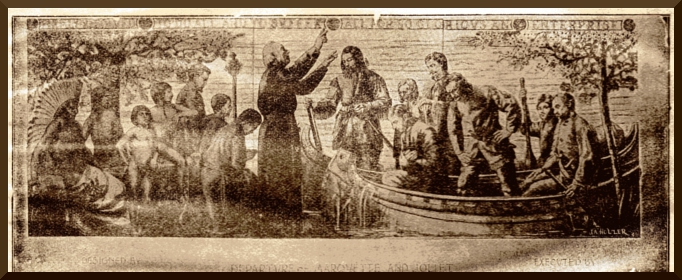
The Departure of Marquette and Jolliet
“Fully resolved to do and suffer everything for so glorious an undertaking” – from Father’s journal,1673
In July, on their return home along the Illinois River, Fr. Marquette made a stop to minister to a dying infant, baptizing him “by an admirable providence, for the salvation of its innocent soul”, thus recording the first sacramental baptism in the Mississippi Valley. They reached home, the Mission of St. Francois Xavier at DePere, Wisconsin, at the end of September. From the book: “Marquette’s weaker constitution was so seriously impaired by the fatigues of the exploration that he never afterward became a well man. He performed, indeed, all the duties of his priestly office, but illness followed him so relentlessly that it was not until the following year he was able to complete his report and send it to his Father Superior, Dablon, at Quebec.”
The malady which plagued him was dysentery with hemorrhage, and although sick unto death, he founded his beloved mission to the Illini, the mission of the Immaculate Conception of the Blessed Virgin, the very first Christian church established in the Mississippi Valley. He preached his last sermon to a gathering of 2,000 natives of the Illinois Nation on Holy Thursday of 1675, and after Easter, he made his painful trek north to die, going up the Kankakee (It almost gave me goose-bumps thinking that he must have paddled through the waters that are so close to home! The Kankakee River is only some blocks from our house.) and St. Joseph Rivers. He died en route, on May 19, 1675, “with a countenance beaming and all aglow”, not yet having reached his 38th birthday.
After Father Marquette’s death, Father Claude Dablon would describe him as a man having “unrivaled zeal, and angelic chastity, an incomparable kindness and sweetness, a childlike candor, a very close union with God.”
Jacques Marquette was a relative, through his mother’s side – Rose de la Salle – of St. Jean Baptiste de la Salle (1651-1719), and his sister, Francoise was foundress of an order, the Sisters of the Providence of Laon. The zeal of his priestly soul had been whetted by reading the Relations, the accounts of the toils and martyrdom of the missionary Jesuits in North America and he longed for the day when he could join them in the hostile foreign missions. Once there, he was to experience tremendous sufferings in both mind and body, but nonetheless, he remained happy for having been given the privilege of “opening the doors of bliss to the dying infant or more aged repenting sinner.”
Now, that’s a priestly missionary spirit par excellence

